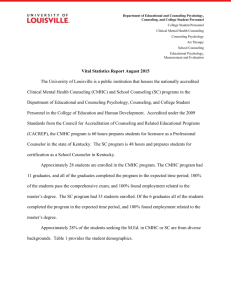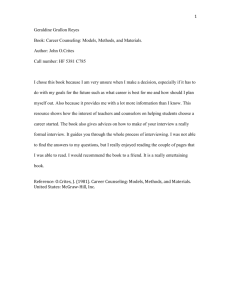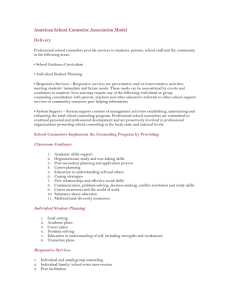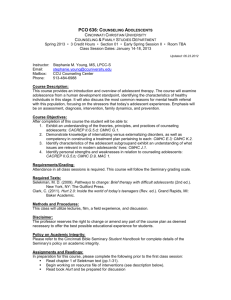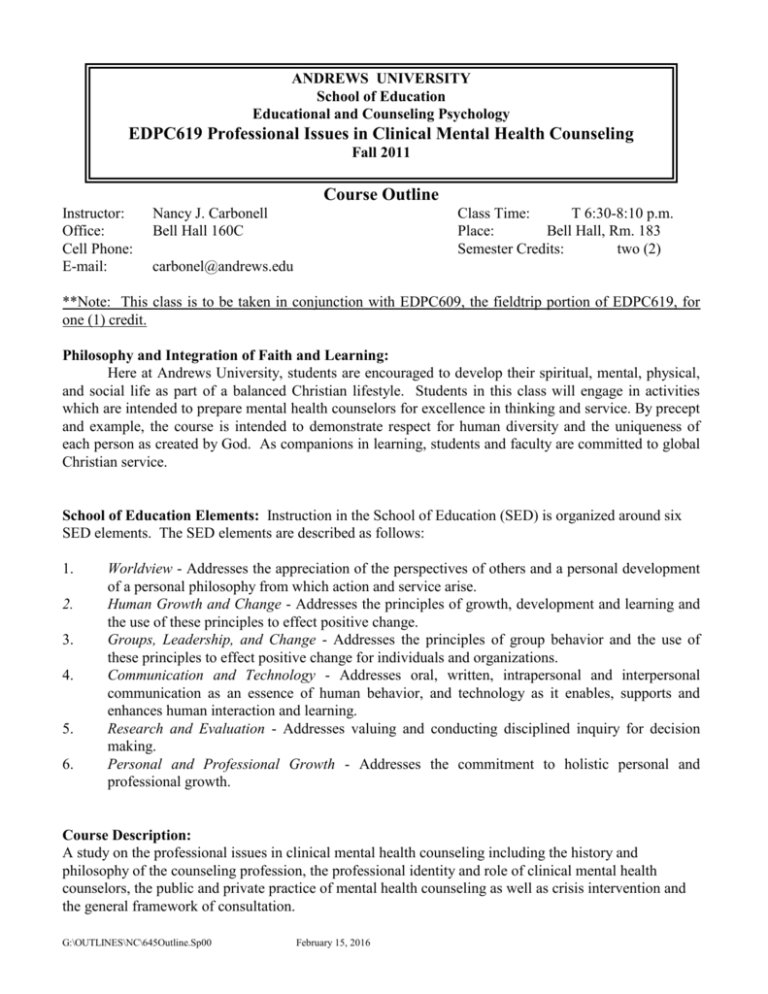
ANDREWS UNIVERSITY
School of Education
Educational and Counseling Psychology
EDPC619 Professional Issues in Clinical Mental Health Counseling
Fall 2011
Course Outline
Instructor:
Office:
Cell Phone:
E-mail:
Nancy J. Carbonell
Bell Hall 160C
Class Time:
T 6:30-8:10 p.m.
Place:
Bell Hall, Rm. 183
Semester Credits:
two (2)
carbonel@andrews.edu
**Note: This class is to be taken in conjunction with EDPC609, the fieldtrip portion of EDPC619, for
one (1) credit.
Philosophy and Integration of Faith and Learning:
Here at Andrews University, students are encouraged to develop their spiritual, mental, physical,
and social life as part of a balanced Christian lifestyle. Students in this class will engage in activities
which are intended to prepare mental health counselors for excellence in thinking and service. By precept
and example, the course is intended to demonstrate respect for human diversity and the uniqueness of
each person as created by God. As companions in learning, students and faculty are committed to global
Christian service.
School of Education Elements: Instruction in the School of Education (SED) is organized around six
SED elements. The SED elements are described as follows:
1.
2.
3.
4.
5.
6.
Worldview - Addresses the appreciation of the perspectives of others and a personal development
of a personal philosophy from which action and service arise.
Human Growth and Change - Addresses the principles of growth, development and learning and
the use of these principles to effect positive change.
Groups, Leadership, and Change - Addresses the principles of group behavior and the use of
these principles to effect positive change for individuals and organizations.
Communication and Technology - Addresses oral, written, intrapersonal and interpersonal
communication as an essence of human behavior, and technology as it enables, supports and
enhances human interaction and learning.
Research and Evaluation - Addresses valuing and conducting disciplined inquiry for decision
making.
Personal and Professional Growth - Addresses the commitment to holistic personal and
professional growth.
Course Description:
A study on the professional issues in clinical mental health counseling including the history and
philosophy of the counseling profession, the professional identity and role of clinical mental health
counselors, the public and private practice of mental health counseling as well as crisis intervention and
the general framework of consultation.
G:\OUTLINES\NC\645Outline.Sp00
February 15, 2016
Content Knowledge Base:
Clinical Mental health counseling is an area of specialization within the profession of counseling. In 1981
the Council for Accreditation of Counseling and Related Educational Programs (CACREP) was
established to accredit counseling programs. The 2009 CACREP standards for Clinical Mental Health
Counseling programs require evidence of student learning in knowledge, skills, and practices in the
following domains: foundations; counseling, prevention, and intervention; diversity and advocacy;
assessment; research and evaluation; and diagnosis.
Textbooks: (Required for all students):
Dougherty, A. M. (2009). Psychological consultation and collaboration in school and community settings
(5th ed.). Belmont, CA: Brooks/Cole.
Gerig, M. S. (2007). Foundations for mental health and community counseling: An introduction to the
profession. Upper
Saddle River, NJ: Pearson Prentice-Hall.
Kanel, K. (2007). A guide to crisis intervention (3rd ed.). Belmont, CA: Brooks/Cole.
Course Objectives: (#) - refers to school of Education Knowledge base this objective meets. (CMHC #)
– refers to the CACREP objective being met for the M.A. in Clinical Mental Health Counseling degree.
Students completing this course are expected to demonstrate a knowledge and understanding of:
1. the history, philosophy, and current trends in clinical mental health counseling. (6) (CMHC A.1)
2. the roles and functions of clinical mental health counselors in various practice settings and the
importance of relationships between counselors and other professionals, including interdisciplinary
treatment teams. (6) (CMHC A.3)
3. the professional organizations, preparation standards, and credentials relevant to the practice of clinical
mental health counseling. (6) (CHMC A.4)
4. a variety of models and theories related to clinical mental health counseling, including the methods,
models, and principles of clinical supervision. (6) (CHMN: A.5)
5. professional issues that affect clinical mental health counselors (e.g. core provider status, expert
witness status, access to and practice privileges within managed care systems. (6) (CHMC A.7)
6. the management of mental health services and programs, including areas such as administration,
finance, and accountability. (6) (CMHC A.8)
7. the impact of crisis, disasters, and other trauma-causing events on people. (6) (CMHC A. 9)
8. the operation of an emergency management system within clinical mental health agencies and in the
community. (6) (CMHC A.10)
G:\OUTLINES\NC\645Outline.Sp00
February 15, 2016
9. how to apply knowledge of public mental health policy, financing, and regulatory processes to
improve service delivery opportunities in clinical mental health counseling. (6) (CMHC B.2)
10. the principles of mental health, including prevention, intervention, consultation, education, and
advocacy, as well as the operation of programs and networks that promote mental health in a
multicultural society. (6) (CMHC C.1)
11. the models, methods, and principles of program development and service delivery (e.g., support
groups, peer facilitation training, parent education, self help). (6) (CMHC C.3)
12. the range of mental health service delivery – such as inpatient, outpatient, partial treatment and
aftercare – and the clinical mental health counseling services network. (6) (CMHC C.5)
13. the principles of crisis intervention for people during crisis, disaster, and other trauma-causing
events. (6) (CMHC C.6)
14. professional issues relevant to the practice of clinical mental health counseling. (6) (CMHC C.9)
15. promoting optimal human development, wellness, and mental health through prevention, education,
and advocacy activities. (6) (CMHC D.3)
16. the effective strategies to support client advocacy and influence public policy and government
relations on local, state, and national levels to enhance equity, increase funding, and promote programs
that affect the practice of clinical mental health counseling. (6) (CMHC E.4)
17. public policies on the local, state, and national levels that affect the quality and accessibility of
mental health services. (6) (CMHC E. 6)
18. becoming advocates for policies, programs, and services that are equitable and responsive to the
unique needs of clients. (6) (CMHC F.2)
19. of the models of program evaluation for clinical mental health programs. (6) (CMHC I.2)
20. the appropriate use of diagnosis during a crisis, disaster, or other trauma-causing event. (6) (CMHC
K.6)
Special Needs Accommodation:
If because of a disability, you require assistance or reasonable accommodations to complete assigned
work, speak with me after class or during my office hours. I will work with you on making this course,
class activities, and exercise accessible for your full involvement. Support services for students with
disabilities is available through the Student Services Office. They can be contacted at (269) 471-6096
G:\OUTLINES\NC\645Outline.Sp00
February 15, 2016
Method of Instruction:
The method of instruction will consist of class lectures and discussion, researching and addressing topics
that advocate the counseling profession and/or activities, D2l discussion and assignments, role playing,
videos, readings, final exam, guest speakers, and exposure to the pertinent research in this area.
Course Requirements:
1. Participation. All students should come to each class period with the appropriate chapter read and
actively participate in class discussions, small group activities and role-playing experiences. Only
University recognized excuses will be accepted in the case of an excused absence. Also, please
note that three tardies to the class equal one absence. All class sessions will occur on
Tuesday evenings, from 6:30-8:10 p.m., in room 180, Bell Hall. The topics to be discussed can
be found in the enclosed class schedule.
2. Diagram of Key Events in Counseling Profession. All students will diagram the key events leading
to the development of their profession. Be creative. Due in class on September 6, 2011. Worth
20 points.
2. Agency Visit. You are required to select two mental health agencies that provide counseling services
in the community, contact the agency, and schedule a meeting with someone on staff who can
inform you of the types of services provided by their agency. Please plan on visiting the agency in
person in order to conduct the interview. You will then prepare a report to the class, of no longer
than 15 minutes, as to what you found. Sections to be included in your report are: description of
the agency, location, mission statement, agency goals, target population, staff patterns (who are
hired as counselors; what is their credentials and how many on staff), future employment
opportunities for counselors, sources of funding, salaries, types of services offered, client
demographics (i.e. sex, age, ethnicity), mean number of sessions per client, and how the agency
interfaces with other agencies. You may use the attached “Suggestions for Agency Interview”
sheet. Your report must be turned in with a final section which will consist of your personal
reaction to the agency (i.e. would you work there? Why or why not?) . The paper should conform
to APA format standards. Please use appropriate headings. Each report should be 4-6 pages long,
not counting the title and reference page. The entire project is worth 60 points. Grading will be
based on the content, clarity, and thoughtfulness of both the presentation and the paper, as well as
adherence to APA format. See attached grading rubric for this assignment. Due Date: November
15, 2011. A drop box will be provided for submission of your paper on aumoodle.
3. Interview of Counseling Professionals. Students will interview in person (face-to-face) one
mental health professional about their professional role and important issues within the field.
(See attached Interview Outline). The professional must have received his/her training and
graduate education as counselors in a program hopefully similar to the Clinical Mental Health
Counseling program. If you have any doubt about the training of the individual you plan to
interview, please ask him/her about his/her training PRIOR to your interview or contact me to
verify that he/she is appropriate for this assignment. Also, you may not interview a family
member or close friend for this assignment. Any deviation from using the appropriate
professional will result in a loss of 10 points for the assignment.
G:\OUTLINES\NC\645Outline.Sp00
February 15, 2016
After conducting the interview, you are to write a reaction paper to the interview, indicating the
issues that were of particular interest to you about the counseling profession, the training, the role
of the counselor, the environment in which a counselor works in, the responsibilities given to the
counselor, and the current issues within the field that affect a counselors role/career/job.
Please remember this is a reaction paper to the interview. The paper should reflect your
awareness of the profession and role as a counselor as opposed to a summary of the interview.
Do not offer a summary of the interview but your REACTION to it. I am looking for your “inner
dialogue” of the interview. When you discuss the interview, do so in context of your reaction
to the responses. A running account of what was said is not important though it is important to
include the items in the “Interview Guideline Questions” sheet attached to this syllabus. Your
paper should be 6-8 pages in length. The paper is worth 30 points. Grading will be based on
the content, clarity, and thoughtfulness of the paper, as well as adherence to APA format. See
attached grading rubric for this assignment. Due Date: November 29, 2011. A drop box will be
provided for submission of your interview paper on aumoodle.
4. Advocacy Project. As counselors and agents of social change, we impact the community and the
profession in a variety of ways. Our voices and knowledge create change for our profession and
for our clients. Two avenues to effect such change include contacting legislative bodies that
create laws that effect our profession and clients and/or researching human services for our clients
and ourselves. Both opportunities involve education and advocacy. You are to write a letter or
email related to legislative action. You will need to explore the ACA and state counseling
association websites to become aware of the need for various legislative actions. Examples
include legislative actions that provide reimbursement for counselors’ services, that promote
counselors’ rights to practice within the limits of their training, that advocate for services for
students in schools etc.
To create a thoughtful and well-informed letter/email, you will need to engage in your own
research on the subject and include that information in your letter/email with correct referencing
of resources (you must cite at least two professional references of research in the body of your
letter and include a references page). You may not use a standard letter that an organization has
prepared. This letter/email must be in your own words. You will also be asked to make a 5-10
minute presentation of the advocacy project you chose in order to rally support and inform your
fellow colleagues. Make sure to address what you learned about the role of advocate, what you
learned about yourself as an advocate, and as a result of this project, what role advocacy will have
in the future. The project is worth 30 points. Grading will be based on content, clarity, creativity
of presentation, ownership, and enthusiasm for the project. See attached grading rubric for this
assignment. Due date: November 29, 2011.
5.
Mental Health Issue Assignment. Students will complete a written assignment that addresses
mental health issues/problems/trends that confront Clinical Mental Health Counselors. These
topics include, but are not limited to: life as a counselor, family violence, substance abuse,
adolescent issues, advocacy issues, crisis intervention issues, consultation issues, prof. identity,
parenting problems, sexual abuse (adult, adolescent, child). You will pick a topic of interest to
you, and explore what contributes to the problem, common treatments/interventions used, and
types of training available to prepare oneself to better deal with such a presenting problem.
Assessments used to clarify intensity or severity would also be good to include in your paper if
available. Referenced articles are to be taken from a recent (2005 or later) scholarly journal. The
paper should be 5-7 pages in length, using Times New Roman, size 12 font. Use of APA format
G:\OUTLINES\NC\645Outline.Sp00
February 15, 2016
is expected for your title page, body of paper, and your reference page. Publication of the article
and/or making a presentation on the topic in a professional venue is the goal. I am willing to help
each of you accomplish this goal. Plagiarism will result in an automatic failing grade. See
attached grading rubric for this assignment. Due November 1, 2011. A drop box will be
provided to drop off your paper on aumoodle.
7.
Final Exam. On December 6, 2011, at 6:30 PM, you will have your final exam. Questions will
be taken from the study objectives provided you. The Exam is worth 125 points.
8.
Professional Membership. An important part of developing and enriching your identity as a
professional counselor is by becoming a member of a professional organization in your field. For
Clinical Mental Health Counselors this means becoming a member in the American Counseling
Association (ACA) or the American Mental Health Counselors Association (AMHCA). Because
our program is CACREP-accredited, it is required that all of our students must seek membership
in one of the professional organizations mentioned above while they are still students in training.
For this reason, I am asking that each student show proof of being a student-member in one of the
above organizations by the end of October. No final grade will be given to any student who does
not fulfill this requirement.
Total Points Possible:
Class Participation…………………………………………….
15 points
Diagram of Counseling Prof. History ………………………...
20 points
Agency Visit ………………………………………………….
30 points
Interview ……………………………………………………..
30 points
Advocacy Project……………………………………………..
30 points
Mental Health Issue Assignment………………………………
75 points
Final Exam…………………………………………………….
125 points
Professional Membership……………………………………..
Required to Pass Class
Total Points:
295 points
Final letter grades will be assigned according to the following percentages of total possible points:
A = 93% or above
A- = 90% - 92%
B+ = 88% - 89%
B = 83-87%
B- = 80%-82%
C+ = 78%-79%
C = 73%-77%
C- = 70%-72%
D = 69% or less
Please note: Since this is considered a core course in the MA in Clinical Mental Health Counseling program, all
students are required to obtain at least a B- for the course to count towards their degree, also remembering that one
must maintain a 3.0 overall GPA to remain in the program. Please refer to program handbook for more
information on grade assignment.
G:\OUTLINES\NC\645Outline.Sp00
February 15, 2016
ANDREWS UNIVERSITY
School of Education
Educational and Counseling Psychology
EDPC619 Professional Issues in Clinical Mental Health Counseling
Fall Semester 2011
CLASS SCHEDULE
DATE
Aug
Sept
TOPIC
23
ASSIGNMENT DUE
Introduction and Review of EDPC619 Class Outline
Final Exam Objectives Handout/MCA Conference Fieldtrip
30 Chapter 1: What is a Licensed Mental Health Counselor?
(Gerig)
Chapter 1 (Gerig)
6
Chapter 2 (Gerig)
Design a diagram showing
key events in the
development of the
Counseling profession.
Chapters 3 & 4 (Gerig)
Chapter 2: Historical Perspective
(Gerig)
13 Chapter 3: Theoretical Foundations for Counselors
Chapter 4: Traditional & Contemporary Theories of Counseling
(Gerig)
Oct
20 Chapter 5: Education, Licensure, and Certification
Chapter 6: Employment Settings for Counselors
(Gerig)
Chapters 5 & 6 (Gerig)
27 Chapter 7: Appraisal & Research in the Practice of Counseling
Chapter 8: Professional Practice in Multicultural Contexts
(Gerig)
4 Chapter 9: Ethical and Legal Issues
Chapter 10: Managed Care & Third-Party Reimbursement
(Gerig)
Chapters 7 & 8 (Gerig)
Chapters 9 & 10 (Gerig)
11 Midterm Break
Nov
18 Chapter 11: The Changing Faces of Community Mental Health
Chapter 12: The Future for Counseling
(Gerig)
Chapters 11 & 12 (Gerig)
25 Chapter 1: What is a Crisis?
Chapter 2: The History of Crisis Intervention
Chapter 3: Ethical & Professional Issues
Chapter 4: Cultural Sensitivity in Crisis Intervention
(Kanel)
Chapters 1-4 (Kanel)
1 Chapter 5: ABC Model of Crisis Intervention
Chapter 6: When Crisis Is a Danger
Crises Related to Particular Situations
(Kanel)
DSM Diagnosis and Crisis Interventions
Chapters 5-6 (Kanel)
G:\OUTLINES\NC\645Outline.Sp00
February 15, 2016
November 6-7
EDPC609 Field Trip part of EDPC619
“All Michigan Counselors’ Conference: Growing Strong Together”
Radisson Plaza Hotel, Kalamazoo Center
Kalamazoo, MI
8 Consultation
Mental Health Assignment
Chapters 1-4 (Dougherty)
15 Consultation
Journal’s for Fieldtrip Due
22 Thanksgiving Break
29 Class Presentations: Advocacy Project
Dec
Class Presentations
6 Final Exam 6:30-8:10
NOTE: This is a tentative schedule and any part of it may be changed at the discretion of the professor if it is deemed
important for the good of the class or/and the students.
Academic Honesty:
Andrews University, as a Seventh-day Adventist institution, expects students to demonstrate the ability to
think clearly and exhibit personal moral integrity in every sphere of life. Honesty in all academic matters
is a vital component of personal integrity. Breaches in academic integrity principles are taken seriously
by the University. Acts of academic dishonesty as described in the University Bulletin are subject to
incremental disciplinary penalties with redemptive intent. Such acts are tracked in the office of the Vice
President for Academic Administration. Repeated and/or serious offenses will be referred to the
Committee on Academic Integrity for further recommendations on penalties.
Academic dishonesty applies equally to electronic media and print, and involves text, images, and
ideas. It includes but is not limited to the following examples:
Cheating
1. Copying from others during an examination.
2. Communicating exam answers with other students during an examination.
3. Offering another person's work as one's own.
4. Taking an examination for another student or having someone take an examination for oneself.
5. Sharing answers for a take-home examination or assignment unless specifically authorized by
the instructor.
6. Tampering with an examination after it has been corrected, then returning it for more credit.
7. Using unauthorized materials, prepared answers, written notes or information concealed in a
blue book or elsewhere during an examination.
G:\OUTLINES\NC\645Outline.Sp00
February 15, 2016
8. Allowing others to do the research and writing of an assigned paper (including use of the
services of a commercial term-paper company).
Dishonest Conduct
1. Stealing or attempting to steal an examination or answer key from the instructor.
2. Changing or attempting to change academic records without proper sanction.
3. Submitting substantial portions of the same work for credit in more than one course without
consulting all instructors involved.
4. Forging add/drop/change cards and other enrollment documents, or altering such documents
after signatures have been obtained.
5. Intentionally disrupting the educational process in any manner.
6. Allowing another student to copy off of one's own work during a test.
Plagiarism
Plagiarism is intellectual theft. It means use of the intellectual creations of another without proper
attribution. Plagiarism may take two main forms, which are clearly related:
1. To steal or pass off as one's own the ideas or words, images, or other creative works of another.
2. To use a creative production without crediting the source, even if only minimal information is
available to identify it for citation.
Credit must be given for every direct quotation, for paraphrasing or summarizing a work (in
whole, or in part, in one's own words), and for information which is not common knowledge.
Collusion
Any student who knowingly or intentionally helps another student perform any of the above acts
of cheating or plagiarism is subject to discipline for academic dishonesty.
If I have evidence of student dishonesty, I will first discuss the matter with the student and then take one
of the following actions:
1. Issue a reprimand to the student with a letter of explanation to the
student's file.
2.
Require repetition of the questionable work or examination with a
letter of explanation to the student's file.
3. Reduce the grade to an 'F' or zero, if appropriate, on the questionable
work or examination with written notification to the student and a
letter of explanation to the student's file.
4. Assign the student a failing grade in the course or otherwise lower the
grade in the course with a letter of explanation to the student’s file.
G:\OUTLINES\NC\645Outline.Sp00
February 15, 2016
Suggestions for Agency Interview
Name of Mental Health Agency
Contact Person
Address
Phone Number
E-mail Address
Website
Mission Statement
Agency Goals
Area Served (Cities, Counties, Organizations, etc)
Target Populations/Types of Clients (Child, Adolescents, Adults, etc)
Client Demographics (sex, age, ethnicity)
Types of Services Offered/Services Provided (Individual, Family, Couples, Groups, etc)
Staff Patterns/Types of Mental Health Professionals/Credentials (degrees/how many are on
staff/who is hired as counselors/what are their credentials, etc)
Fees/Salaries/Funding Received for Services Provided
Procedures to make a referral to the agency:
Are there internship opportunities at the agency for counselor trainees? Who to contact?
How does the agency deal with financial challenges and accountability?
How does the agency deal with crises and disasters? What plans are in place?
How does this agency interface with other agencies and other professionals? How important is this?
G:\OUTLINES\NC\645Outline.Sp00
February 15, 2016
Interview Outline
Please include all of these questions in your paper:
1.
2.
3.
4.
5.
6.
7.
How long has the person been a mental health professional?
Does the mental health professional have a specialization or clinical focus, if so, what is it?
What led him or her to choose a career in the mental health field?
What theory(ies) guide(s) the mental health professionals’ practice?
What is his/her personal theory of how clients change?
What therapeutic techniques/counseling skills does he/she use with clients?
In what ways does the mental health professional utilize multicultural counseling competencies in
his/her work?
8. How does the mental health professional see him/herself as an advocate in the counseling
profession?
9. What does he/she see as current issues that the profession is facing?
10. What s/he likes most (and least) about their work?
11. How did his/her training best and least prepare them for the realities of being a mental health
professional?
12. What advice would they offer you as a beginning counselor-in-training?
13. For the mental health professional that is not a counselor, how does his/her job differ from other
the other mental health professionals you interviewed? How is it alike?
Please also include a discussion of the impressions you had of the office/environment in which you
interviewed the professionals. What was it like? How would it feel to be a client?
G:\OUTLINES\NC\645Outline.Sp00
February 15, 2016
Rubric for Agency Visit
Outstanding
29-30 points
*Superb presentation
-within time limits
-flawless use of
technology
` -well prepared
-captivating
*Handouts complete
*Content in depth &
relevant
*Question/Answer period
handled excellently
*Creative & thorough
*Covered all material
requested & more
*Paper Superb
-no typos
-neat/APA style used
-Superb writing style
G:\OUTLINES\NC\645Outline.Sp00
Excellent
25-28
points
Standard
18-24 points
*Standard presentation
-within 10 minutes of
time limit
-OK use of
technology
` -prepared
-interesting *Handouts
OK
*Content covered as
assigned
*Question/Answer
period handled OK
*Covered all material
assigned
*Paper standard
-few typos
-neat/APA style used
-acceptable writing
style graduate level
February 15, 2016
Below
Standard
12-17 pts.
Weak
Below 11 points
*Below Standard
presentation
-time limit not
respected
-poor use of
technology
` -unprepared
*Handouts
missing
*Content poorly
covered as
assigned
*Question/Answer
period handled
poorly
*Paper poorly
written
-excessive
typos
- APA style
not used
-poor writing
style
Rubric for Interview Assignment
Outstanding
29-30 points
Excellent
25-28 pts
*Paper Superb
-no typos
-neat/APA style
used
-Superb writing
style
*Deeply reflective
*Application
personal
*Great interview
skills noted
*Material
covered superbly
*Exciting to read
G:\OUTLINES\NC\645Outline.Sp00
Standard
18-24 points
*Paper standard
-few typos
-neat/APA style used
-acceptable writing
style graduate level
* Adequately reflective
*Application
personal
*Sufficient interview
skills noted
*Material
covered as assigned
*Interesting to read
February 15, 2016
Below
Standard
12-17 pts.
Weak
Below 11 points
*Paper poorly
written
-excessive
typos
- APA style
not used
-poor writing
style
* Not reflective
*Personal application
missing
* Poor interview
skills noted
*Poor coverage of
information assigned
*Hard to follow
Rubric for Advocacy Project
Outstanding
29-30 points
Excellent
25-28 pts.
*Letter/email
Superb
-no typos
-neat/APA style
used
-Superb writing
style
*Superb
presentation
-within time
limits
-flawless use of
technology
` -well prepared
-captivating
*Handouts
complete
*Content in depth
& relevant
*Question/Answer
period
handled
excellently
*Creative &
thorough
*Covered all
material
requested & more
G:\OUTLINES\NC\645Outline.Sp00
Standard
18-24 points
*Letter/email standard
-few typos
-neat/APA style used
-acceptable writing
style graduate level
-thoughtful and
well-informed
-correct referencing
*Evidence of good
researching of topic
*Standard presentation
-within 10 minutes of
time limit
-OK use of
technology
` -prepared
-interesting
*Handouts OK
*Content covered as
assigned
*Question/Answer
period handled OK
February 15, 2016
Below
Standard
12-17 pts.
Weak
Below 11 points
*Paper poorly
written
-excessive
typos
- APA style
not used
-poor writing
style
*Below Standard
presentation
-time limit not
respected
-poor use of
technology
` -unprepared
*Handouts
missing
*Content poorly
covered as
assigned
*Question/Answer
period handled
poorly
Rubric for Topic in Mental Health Paper
Outstanding
Excellent
*Paper Superb
-no typos
-neat/APA style
used
-Superb writing
style
*Material
covered superbly
*Exciting to read
*Outstanding
research skills
noted
*References used
impressive
G:\OUTLINES\NC\645Outline.Sp00
Standard
*Paper standard
-few typos
-neat/APA style used
-acceptable writing
style graduate level
*Material
covered as assigned
*Interesting to read
*Good research skills
noted
*Adequate references
used
February 15, 2016
Below
Standard
Weak
*Paper poorly
written
-excessive
typos
- APA style
not used
-poor writing
style
*Poor coverage of
information assigned
*Hard to follow
*Poor research skills
noted
*References used
lacking
Topics to Know for Final Exam
1. Know the history, philosophy, and current trends in clinical mental health counseling. (CMHC A.1)
2. Show an understanding of why the professional organizations exist, how they contribute to the
professional field of counseling, how and why preparation standards are developed, and show an
understanding of why credentials are relevant to the practice of clinical mental health counseling
(CHMC A.4)
3. Show an understanding of the variety of models and theories related to clinical mental health
counseling covered in your textbook, including the methods, models, and principles of clinical
supervision.(CHMN: A.5)
4. Be able to discuss the impact of crisis, disasters, and other trauma-causing events on people. (CMHC
A. 9)
5. Be able to articulate and demonstrate understanding of the principles of mental health, including
prevention, intervention, consultation, education, and advocacy, as well as the operation of programs and
networks that promote mental health in a multicultural society.(CMHC C.1)
6. Demonstrate knowledge of the models, methods, and principles of program development and service
delivery (e.g., support groups, peer facilitation training, parent education, self help). (CMHC C.3)
7. Be able to apply the principles of crisis intervention for people during crisis, disaster, and other
trauma-causing events. (CMHC C.6)
8. Demonstrate an understanding of the CMHC role in promoting optimal human development, wellness,
and mental health through prevention, education, and advocacy activities. (CMHC D.3)
9. Demonstrate an understanding of the effective strategies to support client advocacy and influence
public policy and government relations on local, state, and national levels to enhance equity, increase
funding, and promote programs that affect the practice of clinical mental health counseling. (CMHC E.4)
10. Have an understanding of how to inform yourself of the public policies on the local, state, and
national levels that affect the quality and accessibility of mental health services. (CMHC E. 6)
11. Know the models of program evaluation for clinical mental health programs. (CMHC I.2)
12. Demonstrate an understanding of the appropriate use of diagnosis during a crisis, disaster, or other
trauma-causing event. (CMHC K.6)
G:\OUTLINES\NC\645Outline.Sp00
February 15, 2016


